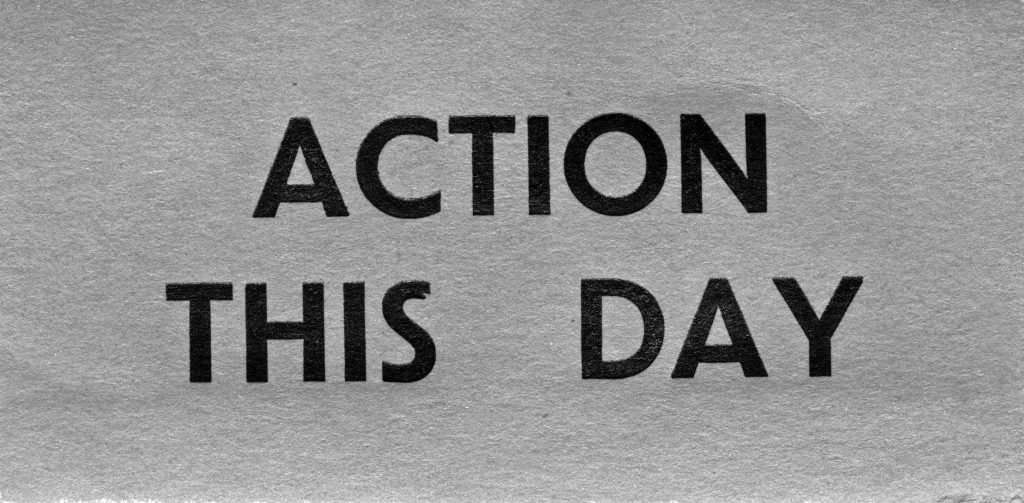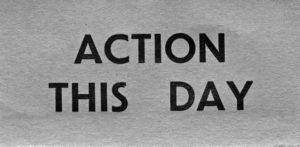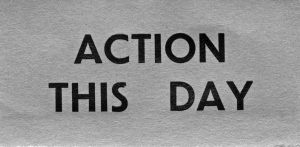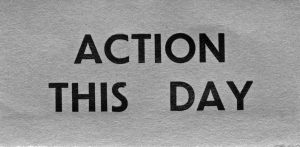Finest Hour 176
Action This Day

August 21, 2017
Finest Hour 176, Spring 2017
Page 42
By Michael McMenamin
125 Years ago
Spring 1892 • Age 17
“His Quick and Dashing Attack”
Winston ’s parents knew of his interest in fencing, but he modestly downplayed his talents, telling his father in a mid-February letter, “I am getting on with my fencing and hope, with luck, to be school champion.” A month later he wrote his mother: “I am awfully excited about the fencing which comes off on Tuesday. I know I shall get beaten yet…!”
On 24 March, Winston wrote his mother, telling her that he had “won the Fencing” at Harrow and received a “very fine cup.” His earlier modesty was cast aside as he went on to say, “I was far and away the first. Absolutely untouched in the finals.” He had also written to his father about it, and Lord Randolph replied on 25 March: “I congratulate you on your success. I only hope fencing will not too much divert your attention from the army class.” His father enclosed a twopound note “with which you will be able to make a present to yr fencing master.”
Winning the fencing championship at Harrow meant that Winston would represent his school at the all-Public Schools gymnastic, boxing, and fencing competition to be held at Aldershot in early April. He wrote to his father on 27 March asking him if he would be able to attend, as “I would so much like you to go.” Unfortunately, he also asked his father if he “could send me a sovereign for myself,” since it “would be great service in making up my accounts.”
That was a mistake. While Lord Randolph did send the money, it was accompanied by a lecture on Winston’s extravagance, telling him that if he “were a millionaire, you could not be more extravagant…. This cannot last, & if you are not more careful should you get into the army six months of it will see you in the Bankruptcy Court. Do think this all over & moderate your ways & ideas.” He also told Winston that “I fear I cannot possibly get to Aldershot” for the fencing competition, because it conflicted with the “Sandown races which I must go to.”
Winston became the Pubic Schools Fencing Champion at Aldershot in April. The school paper, the Harrovian, wrote: “His success was chiefly due to his quick and dashing attack, which quite took his opponents by surprise…. Churchill must be congratulated on his success over all his opponents in the fencing line, many of whom must have been much taller and more formidable than himself.”
100 Years ago
Spring 1917 • Age 42
“Back in the Loop”
After the United States declared war on Germany on 6 April, Churchill, with seemingly no real prospect of being given a cabinet position by Prime Minister Lloyd George, continued to oppose a new Western Offensive in 1917. In an article in The Sunday Pictorial, Churchill argued that “[S]tatesmanship and sound military judgment would decide that it was better to wait that supreme effort [of a new offensive] until the immense, hitherto untouched, and almost immeasurable resources of the United States had been in an effective manner brought into the field in order that the supreme effort might be made with overwhelming power….”
In May, Churchill suggested to his cousin Frederick Guest, the Liberal Chief Whip in Lloyd George’s Coalition Government, that the Prime Minister take the initiative and call a Secret Session of the House of Commons to discuss war policy in order to forestall criticism by the Labour party, Irish Nationalists, and pro-Asquith Liberals. Lloyd George accepted the suggestion and scheduled the Secret Session for 10 May.
Asquith was caught flat-footed and unprepared so that Churchill was the first to open the debate. Roy Jenkins, in his biography of Churchill, calls the speech “one of the several turning points of his long political life…a classic example of his ability to pick out the broad lines of a conjuncture, and to state them in terms which gripped his audience (a packed House) and made their minds receptive to the direction in which he wanted to lead them.” Churchill began by noting that “Russia has collapsed….[An ally whose] army comprised over seven million soldiers has been crushed by the German hammer.” Counter balancing that, Churchill observed, was the fact that the United States had entered the war, “a nation comprising 120 million of the most active, educated and wealthy citizens, commanding instant and almost limitless resources of every kind.” British war policy, therefore, should take these two developments into account. At sea, the “first and decisive danger” was Germany’s unrestricted submarine warfare, which had to be addressed if American intervention were to be effective. “Let the anti-submarine war claim priority and dominance over every form of British effort.”
What this meant for the war policy on land, Churchill said, was “obvious…we ought not to squander the remaining armies of France and Britain in precipitate offensives before the American power begins to be felt on the battlefields….” He then concluded with a summary of his recommendations. “Master the U-boat attack. Bring over the American millions. And meanwhile maintain an active defensive on the Western Front, so as to economize French and British lives, and so as to train, increase and perfect our armies and methods for a decisive effort in a later year.”
The speech was well received by all in the House save Churchill’s most bitter enemies among the Tories. Lloyd George’s speech that followed Churchill’s was also well received, even though he declined to rule out a new offensive later in 1917, as Churchill had urged. The Chief Whip wrote the Prime Minister: “The impression in the House, lobby and smoking room is that you have made a great speech….Winston’s speech is also considered to be a fine statesmanlike effort.”
More importantly for Churchill’s political future, however, was a chance meeting with the Prime Minister after their respective speeches. Churchill wrote in The World Crisis that, on this occasion, Lloyd George “assured me of his determination to have me at his side. From that day, although holding no office, I became to a large extent his colleague.” As Roy Jenkins wrote in his biography of Churchill, “He was emphatically back in the loop.”
75 Years ago
Spring 1942 • Age 67
“Now We See the Ridge Ahead”
In a speech on 26 March, Churchill acknowledged that the fall of Singapore to the Japanese was “the greatest disaster to British arms which our history records.” Defeats continued to mount through the rest of the spring. On 23 March, the Japanese occupied the Andaman Islands in the Bay of Bengal. On 3 April, 2000 civilians were killed in a Japanese bombing raid on Mandalay. On 4 April, Japanese carrier-based airplanes sank four British warships with a loss of life of more than 500 sailors off Ceylon. On 5 April, Japanese aircraft sank two more British warships off Ceylon with more than 300 lives lost. On 6 April, Japanese troops landed on Australia’s Pacific Ocean Mandate, the Solomon Islands. On 9 April, American forces on Bataan surrendered, with more than 35,000 troops taken prisoner. Convoys to Russia also suffered heavy losses in April, with only eight of the twenty-three ships in one convoy getting through. On 3 May, Mandalay surrendered. On 6 May, American forces on Corregidor Island in the Philippines surrendered. On 26 May, Rommel commenced an attack in North Africa that was soon to lead to the fall of Tobruk and the surrender of 33,000 troops.
Against all this, victories were few and humble. Perhaps these are what Churchill optimistically had in mind when, in a speech on 15 May, he said “We have reached a period in the war when it would be premature to say that we have topped the ridge, but now we see the ridge ahead.” On 15 May that ridge seemed pretty far away, but on 4 June the US Navy met and sunk all four aircraft carriers the Japanese had sent to support an invasion of Midway Island, a defeat from which the Japanese Navy never recovered.
On 17 June, Churchill flew to America for a meeting with FDR at Hyde Park. There he presented the President a paper he had written throwing cold water on a half-baked American plan to open a second front in Europe in September 1942—using largely British troops— that Harry Hopkins and General George Marshall had presented to Churchill in London that April. At the time, Churchill had written to FDR that the American plan was “a masterly document” and that he was “in entire agreement in principle with all you propose” (italics added).
Now, having had two months to prepare a rebuttal, Churchill’s paper told the President what he really thought: “No responsible British military authority has so far been able to make a plan for September 1942 which had any chance of success unless the Germans become utterly demoralized, of which there is no likelihood….Have the American staffs a plan? At what points would they strike? What landing craft and shipping are available? Who is the officer prepared to command such an enterprise?” There would be no such invasion for two more years.
Subscribe
WANT MORE?
Get the Churchill Bulletin delivered to your inbox once a month.






